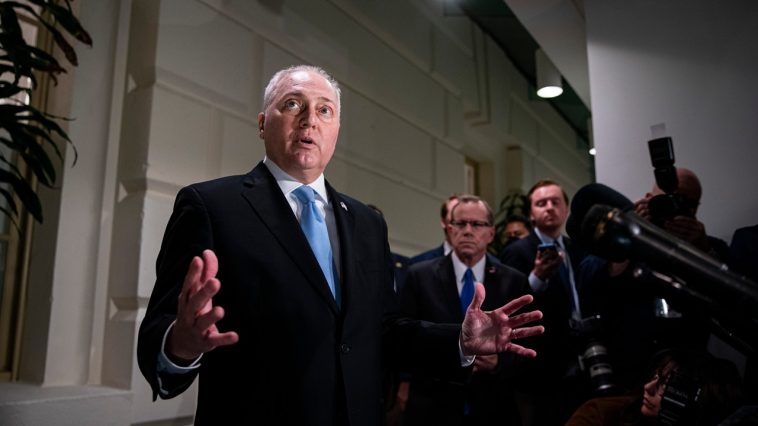House Republicans were faced with a challenging task of finding unity among their ranks as they searched for a new leader. Representative Steve Scalise of Louisiana, the No. 2 Republican, had worked hard to win over his colleagues but unfortunately fell short of the 217 votes required for election. Despite being narrowly nominated for speaker, he faced resistance from hard-line Republicans who refused to support their party’s chosen candidate, Representative Jim Jordan from Ohio. This internal disagreement has left the party divided and the House leaderless, giving rise to a sense of chaos within the GOP.
The closed-door secret-ballot contest held on Tuesday among House Republicans revealed the daunting obstacle faced by Steve Scalise. Although he emerged as the preferred candidate, he lacked the necessary votes to secure the speakership. The divided support within the party hindered his chances, particularly due to the unwavering backing for Jim Jordan, who had garnered the endorsement of former President Donald J. Trump. Despite their best efforts, many of Scalise’s supporters were unwilling to switch their allegiance, resulting in an impasse.
Acknowledging the increasingly tumultuous situation, Steve Scalise ultimately made the difficult decision to withdraw from consideration for the speakership. By stepping aside, he hoped to provide an opportunity for someone else to unite the party amidst this ongoing internal strife. This sudden exit has left Republicans in a state of disarray, questioning who should fill the leadership void and engaging in recriminations about the current chaotic state of affairs. It is apparent that the divisions within the party run deep and resolution remains elusive.
The recent events on Capitol Hill have truly showcased the deep divisions within the Republican Party. Steve Scalise’s victory over Jim Jordan during the internal party contest seemed fleeting, as he quickly began losing supporters from various factions who refused to align themselves with his leadership. Adding fuel to the fire, former President Trump expressed his opposition to Scalise, claiming that his battle with blood cancer rendered him unfit for the speakership. These factors, combined with the lack of explicit endorsements from other prominent House Republicans, contributed to Scalise’s struggle to regain support.
Representative Kevin McCarthy, the ousted former speaker, had a chilly relationship with Steve Scalise and publicly cast doubt on the Louisiana Republican’s ability to recover from this setback. McCarthy suggested that Scalise may have overestimated his backing, alluding to the uphill battle he now faced. This unexpected turn of events reflects the dynamic nature of the House Republican conference, with individual members increasingly prioritizing their own interests rather than uniformly supporting party leaders. This shift has had a significant impact on the ability of the House to address pressing issues both domestically and internationally.
The ongoing uncertainty created by the internal strife within the GOP has severely hindered the House’s ability to navigate multiple crises. With allies engaged in conflict in Israel and Ukraine and a potential government shutdown looming, Congress is facing intense challenges that require swift and decisive action. The absence of a unified party leadership further exacerbates the situation, warranting urgent resolution to prevent further paralysis and potential damage to the nation’s interests. The crisis at hand demands a cohesive Republican leadership that can effectively address these pressing concerns.
Steve Scalise’s tenure in House leadership, which began in 2014, has been marked by personal hardships and unwavering perseverance. Despite battling blood cancer and undergoing intense treatment, he has continued to fulfill his duties while wearing a mask on the House floor and participating in news conferences. Moreover, he overcame a devastating incident in 2017 when he was shot and seriously wounded during a practice for a congressional baseball game. His resilience and commitment to service have played a significant role in his rise as the preferred choice of the majority of Republicans to lead the chamber.
On a separate note, it is important to correct a misstatement in the original version of this article. Dusty Johnson represents South Dakota, not North Dakota, in the House. Accuracy is essential, and this correction ensures that the facts surrounding the individuals involved in the current leadership conundrum are accurately reported. The focus should remain on the ongoing challenges faced by House Republicans and the urgent need for a unified and determined leadership to navigate these difficult times.
In conclusion, the Republican Party finds itself at a critical juncture as it grapples with internal divisions over who should lead them. Representative Steve Scalise’s withdrawal from consideration for the speakership has intensified the uncertainty surrounding Republican unity. The struggle to find consensus within the party highlights a broader shift in the House Republican conference, where members are increasingly pursuing independent strategies rather than rallying behind a chosen leader. With pressing domestic and international challenges at hand, resolving this leadership void becomes paramount for the party’s effective governance and the nation’s welfare.



